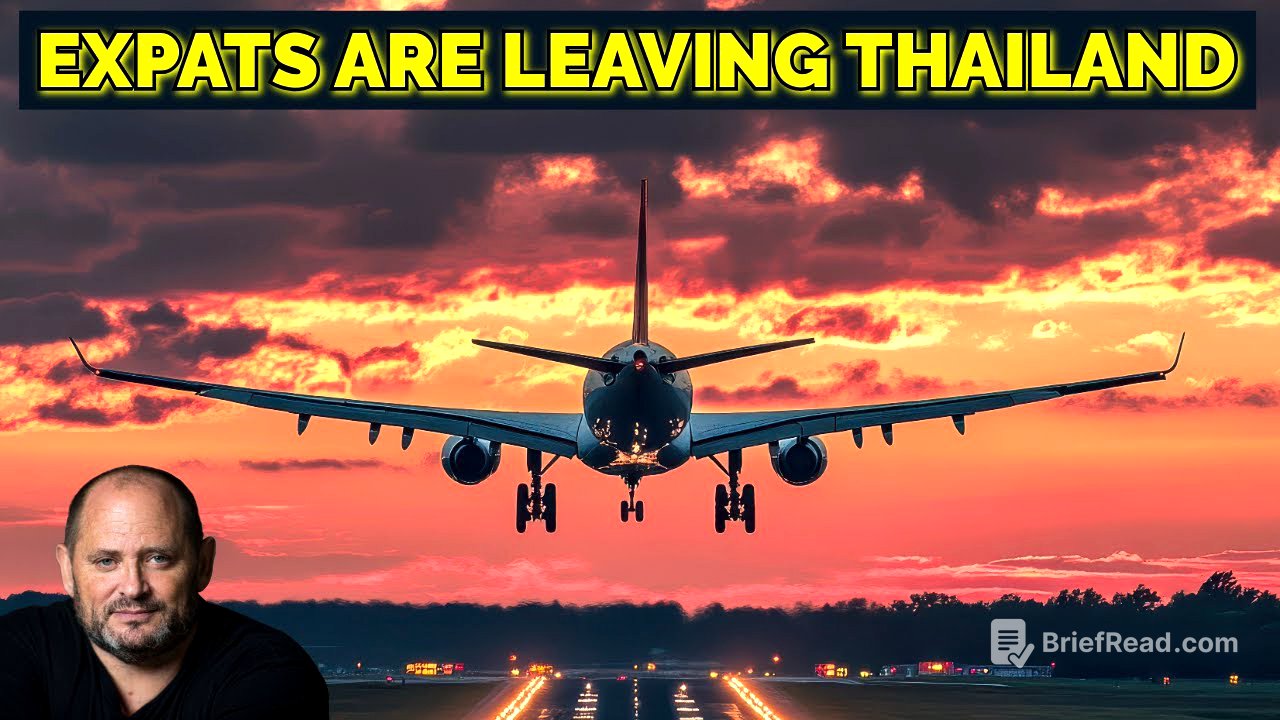TLDR;
The video discusses why many expats are leaving Thailand, despite it being a popular destination for its warm weather, food, and relatively low cost of living. The reasons include the rising cost of living, increasingly difficult visa and immigration policies, traffic and infrastructure issues, pollution and overdevelopment, the feeling of always being a guest, changes in the expat community, political and economic uncertainty, and the availability of better options elsewhere.
- Rising cost of living
- Visa and immigration issues
- Pollution and overdevelopment
- Political and economic uncertainty
Rising Cost of Living [1:14]
Thailand is becoming more expensive, impacting expats, especially retirees on fixed incomes. Rent, food, utilities, and transportation costs have increased. Street food, once very cheap, is now significantly more expensive, and Western or imported food costs have risen considerably. Maintaining the same quality of life as 5-10 years ago requires more money.
Visa and Immigration Issues [2:31]
Thailand's visa policies have become more complicated and difficult, with frequently changing rules and extensive paperwork. The retirement visa requires a significant amount of money in the bank or proof of steady income. Short-term visas necessitate constant renewals, and inconsistent enforcement of immigration laws can lead to border runs. The uncertainty and bureaucracy are driving some expats to seek countries with easier visa options.
Traffic and Infrastructure Problems [3:34]
Bangkok's traffic is notorious, with congestion worsening in smaller cities like Chiang Mai, Pattaya, and Hua Hin due to increased tourism. Public transportation outside of Bangkok is unreliable, and the cost of taxis and ride-hailing apps can add up. Some expats are tired of spending hours in traffic or struggling with transportation options, despite improvements like the BTS and MRT in Bangkok.
Pollution and Overdevelopment [4:53]
Air pollution is a major issue, especially in Bangkok and Chiang Mai, with dangerous air quality during the burning season. Overdevelopment is making cities more crowded and less livable, with high-rise condos going up without corresponding improvements in infrastructure. Noise, pollution, and overcrowding, including water and ground pollution, are causing some expats to leave.
Foreigners Are Always Guests [5:37]
Foreigners cannot own land outright in Thailand and are always considered guests, regardless of how long they have lived there. Laws can change quickly, and expats do not have the same rights as locals. Government decisions on visa policies or business regulations can leave expats with no recourse, leading some to seek more stable and secure environments elsewhere.
Changing Expat Community [6:23]
The expat community is changing, with many long-term Western expats leaving and new groups from China, India, Russia, and Israel moving in. Some long-term residents feel less connected to the new community and find it harder to relate to the new arrivals, contributing to their decision to move on.
Political and Economic Uncertainty [7:04]
Thailand's history of political instability, including protests, coups, and government changes, creates uncertainty. The economy has struggled since COVID-19, leading to the closure of many businesses that relied on expats. Fewer job opportunities combined with the rising cost of living make Thailand less attractive. A survey indicated that 55% of expats plan to leave in 2024 due to new tax liabilities, raising concerns about revenue shortfalls for the government.
Better Options Elsewhere [8:50]
There are many other options for expats, with countries like Vietnam, Cambodia, and the Philippines offering lower costs and easier visa options. Some are moving to Mexico, Portugal, and Ecuador, where they can own property, obtain long-term residency, or access good healthcare. While Thailand is still a great place, it is no longer the best option for everyone due to rising costs, visa issues, pollution, traffic, and uncertainty.









